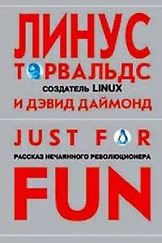Linus Torvalds - Just for Fun
Здесь есть возможность читать онлайн «Linus Torvalds - Just for Fun» весь текст электронной книги совершенно бесплатно (целиком полную версию без сокращений). В некоторых случаях можно слушать аудио, скачать через торрент в формате fb2 и присутствует краткое содержание. Город: NewYork, Год выпуска: 2001, ISBN: 2001, Издательство: HarperCollins Publishers, lnc., Жанр: Программирование, на английском языке. Описание произведения, (предисловие) а так же отзывы посетителей доступны на портале библиотеки ЛибКат.
- Название:Just for Fun
- Автор:
- Издательство:HarperCollins Publishers, lnc.
- Жанр:
- Год:2001
- Город:NewYork
- ISBN:0-06-662072-4
- Рейтинг книги:4 / 5. Голосов: 2
-
Избранное:Добавить в избранное
- Отзывы:
-
Ваша оценка:
- 80
- 1
- 2
- 3
- 4
- 5
Just for Fun: краткое содержание, описание и аннотация
Предлагаем к чтению аннотацию, описание, краткое содержание или предисловие (зависит от того, что написал сам автор книги «Just for Fun»). Если вы не нашли необходимую информацию о книге — напишите в комментариях, мы постараемся отыскать её.
Just for Fun — читать онлайн бесплатно полную книгу (весь текст) целиком
Ниже представлен текст книги, разбитый по страницам. Система сохранения места последней прочитанной страницы, позволяет с удобством читать онлайн бесплатно книгу «Just for Fun», без необходимости каждый раз заново искать на чём Вы остановились. Поставьте закладку, и сможете в любой момент перейти на страницу, на которой закончили чтение.
Интервал:
Закладка:
Forget the clean-cut robot/proselytizers who always seem to bang on your door whenever you're on the computer, concentrating on a tricky technical problem, or whenever the kids are finally napping and you're just starting to get amorous. A more relevant example is close at hand in the open source community: the zealots who believe that every innovation should be licensed under the GPL ("GPL'd" in hacker parlance.) Richard Stallman wants to make everything open source. To him, it's a political struggle, and he wants to use the GPL as a way to drive open source. He sees no other alternative. The truth is, I didn't open source Linux for such lofty reasons. I wanted feedback. And it's how things were done in the early days of computers, when most of the work was done at universities or defense establishments and they ended up being very open. You gave your source away to another university when people asked for it. What Richard did, after getting cut off from projects he loved, was to he the first person to consciously open source.
Yes, there are enormous benefits to be gained by opening up one's technology and making it available under the same terms as Linux and a host of other innovations. To get a glimpse of those benefits, all you have to do is just look at the comparatively low standards of quality of any closed software project. The GPL and open source model allows for the creation of the best technology. It's that simple. It also prevents the hoarding of technology and ensures that anyone with an interest in a project or technology won't be excluded from its development.
This is not a minor point. Stallman, who deserves a monument in his honor for giving birth to the GPL, was inspired to jump-start the free software phenomenon mainly because he was shut out of a succession of interesting development projects when they moved from the open, academic world of the Massachusetts Institute of Technology to the proprietary corporate environment. The most notable of these was the LISP machine. LISP started out as part of the artificial intelligence community. As with many things, somebody thought it was so good that they should form a startup to make it a commercial success and make money on it. This happens all the time at universities. But Richard wasn't part of the commercial crowd, so when LISP became a commercial project under a company named Symbolics in 1981, suddenly he was cut off. To add insult to injury, Symbolics hired away many of his cohorts from the AI lab.
The same thing happened to him a few other times. The way I understand it, his motivation for promoting open source was not so much anticommercial as it was antiexclusion. For him, open source is about not getting left out. It's about being able to continue working on a project regardless of who makes it commercial.
The GPL is wonderful in its gift of letting anyone play.Just think about what a major advance for humanity that is! But does that mean that every innovation should be GPL'd?
No way! This is the abortion issue of technology. It should be up to the individual innovator to decide for herself or himself whether to GPL the project or to use a more conventional approach to copyright. The thing that drives me crazy about Richard is that he sees everything in black and white. And that creates unnecessary political divisions. He never understands the viewpoint of anybody else. If he were into religion, you would call him a religious fanatic.
In fact, the most annoying thing -- second only to religious enthusiasts knocking on my door saying what I should believe in -- is people knocking on my door (or bombarding me with email) saying how I should license my software. This should not be a political issue. People should be able to make up their own minds. It's one thing to suggest to someone that they consider GPLing their software, and then leaving it at that. It's another thing to argue the point. It's really bad when people complain about the fact that I work for a commercial company that doesn't GPL everything it does. I tell them it's not their business.
The thing I find hugely irritating about Richard is not that he believes that Linux -- because its kernel relied on applications from the gnu software project -- should more rightly be called "gnu/Linux." It is not that he openly resents me for being a poster boy for open source even though he was sharing code while I was still sleeping in a laundry basket. No, the reason I find him so pesty is that he continually complains about other people not using the GPL.
I admire Richard from afar for a bunch of reasons. And I guess I tend to respect people, like Richard, who have very strong moral opinions. But why can't they keep these opinions to themselves? The thing I dislike the most is when people tell me what I should or should not do. I absolutely despise people who think they have any say over my personal decisions. (Except, perhaps, my wife.)
Over the course of the development of Linux, pundits such as Eric Raymond have suggested that the operating system's success and the longevity of open source development have partly hinged on my pragmatic approach and my ability to keep from taking sides in disputes. While Eric is arguably the best articulator of the open-source phenomenon (and while I strongly, strongly disagree with his pro-gun sentiments), I believe he's a bit off the mark on his perception of me. It's not that I keep from taking sides. It's just that I so strongly resent anyone who tries to impose his or her morals on others. You can replace the word "morals" with "religion," "computing preferences," whatever.
Just as imposing morals is wrong, the next step -- institutionalizing morals -- is doubly wrong. I'm a big believer in individual choice, which means that I think I should make my own decisions when it comes to moral issues.
I want to decide for myself. I'm very much against unnecessary rules imposed by society. I'm a big believer that you should be able to do whatever you want in the privacy of your own home as long as you don't hurt anybody else. Any law saying otherwise is a very, very broken law. And there are laws that say otherwise. I find some scary rules, especially some that are imposed on schools and children. Imagine even thinking of imposing rules about teaching evolution, and taking that into the wrong direction. That I find scary. This is social conscience rearing its ugly head in places it really has nothing at all to do with.
At the same time, my personal belief is that what is more important than me and my individual moral decisions is, not even the human race, but evolution . To that extent, I want my individual choices to take social issues into account. But that's probably built in. I think it is built into human biology -- evolution -- that we do take social things into account. Otherwise we'd have been gone long ago.
The only other thing worth ranting about: people who are too preachy. There's just no reason for folks to evangelize, and to be so self-righteous about it.
And I'm sounding just like one of them.
But it's an easy trap when people start taking you far too seriously.
XI.
Americans make a big fuss over March 17th (St. Patrick's Day), May 5th (Cinco de Mayo), and October 12th (Columbus Day), but hardly any attention is paid to December 6th, which as any Finn can tell you is Finnish Independence Day.
Most folks in Finland celebrate Finnish Independence Day the way they celebrate everything else, by partying to excess. They party-to-excess -- even by Finnish standards -- the night before and recover in front of the television set for almost the entire national holiday. The option, I guess, is to go out and trudge in the snow hung over.
What keeps everyone glued to their TV sets is a single event: the President's Ball. Finland doesn't have much in the way of high society so the President's Ball is pretty much it, the only truly big society event. It's televised nationally to keep people from driving with hangovers and to prove to ourselves that we can stage our own respectable version of the Academy Awards. No, a better metaphor: It's the Super Bowl of Finnish high society.
Читать дальшеИнтервал:
Закладка:
Похожие книги на «Just for Fun»
Представляем Вашему вниманию похожие книги на «Just for Fun» списком для выбора. Мы отобрали схожую по названию и смыслу литературу в надежде предоставить читателям больше вариантов отыскать новые, интересные, ещё непрочитанные произведения.
Обсуждение, отзывы о книге «Just for Fun» и просто собственные мнения читателей. Оставьте ваши комментарии, напишите, что Вы думаете о произведении, его смысле или главных героях. Укажите что конкретно понравилось, а что нет, и почему Вы так считаете.












